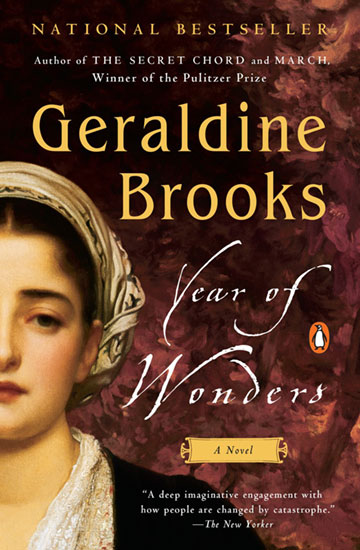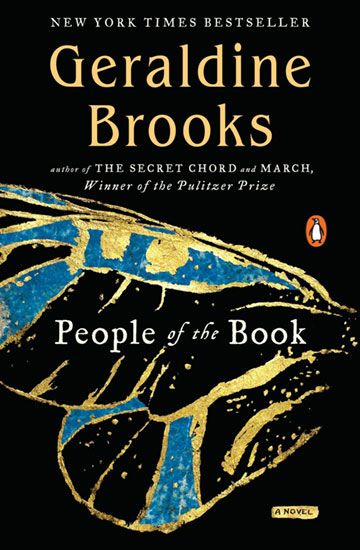Which is ridiculous, but that's the point. I am not a genius, for simply reading two wonderful books in a row. In fact, I'm the lucky beneficiary of Geraldine Brooks' genius. This is truly an author to study and emulate.
From the (actually three) books I've read, it is apparent that Brooks has some personal themes she prefers to write on, and that she is a stunningly detailed researcher. Still, her books are more different than they are similar. The first one I read, The Secret Chord, demonstrated her aptitude for deep characterization, the long arc of a family narrative, and careful research about one point in history. Since then, I've seen her investigate not two, but six other time periods, and tell stories from a dizzying number of perspectives and voices. No wonder she won the Pulitzer. (Also, she was in college when I was born. So, I've got time.)
People of the Book (2008)
Historical Fiction
Reading a review of this book on Goodreads is what piqued my interest in Brooks to begin with. A book about a book, and all the people who were involved in its making and survival through the centuries? Yes please. Hanna, an Australian conservator of ancient manuscripts is called to consult on a famous haggadah, a Jewish book of Passover, when it emerges from the rubble of war in Sarajevo in the 1990s. The book and its rescue, by the way, is real, but the rest of the story is the fiction part. Using tiny artifacts from within its binding, she traces the journey of the book through that war, World War II, Vienna in 1890s, Venice during the Inquisition, Spain and Africa in the time of Columbus. While Hanna has an amazing knowledge of these varied times and places, and learns a great deal about the book through her investigation, the people of the book appear to tell us their own stories, giving the reader more details than Hanna could possibly know. The way the book traveled between the people it touched is often left a tantalizing mystery, though, to us and to Hannah.
One difference I noted in the writing of these three books is that this is the only one with multiple points of view and I think the characterization suffers a little for it. Perhaps it is harder for her to get into the mind of the characters as she switches back and forth, but they take a few pages to find their voice. It's a sacrifice that is worth making, though, to tell this story and immerse us so richly in the surroundings of the characters, as only that manner of story telling could do.
From this book as well as The Secret Chord, it's obvious that Jewish history is important to Brooks. She seems to endow the Jewish characters, the biblical and the historical and the fictional, with the most admirable and honorable qualities. However, she also gives them vices, and presents some honorable Christians and Muslims, despite the atrocities that most of the different religions commit against each other through the ages. That is a lasting impression, the ageless ability of humans to devalue each other, which is apparent in TSC and the next book I read as well.

Year of Wonders (2002)
Historical Fiction
This one is only set in one time period. I know, so lazy of her. This one time and place, though, is fascinating and repulsive and wondrous enough. Just as the haggadah is a real book in The People of the Book, the year 1668 and the village of Eyam in England really existed, and really did fall victim to a horrifying plague. The wonder, though, is that the village decided to close its borders so as to protect their neighbors from the plague. You can imagine the microcosm of humanity that occurred in that year and that place, from the very best of people to the very worst, including murder, witchcraft, love, learning, innocence, forgiveness, revenge, greed, and so many more facets of our intricate natures.
The narrator, Anna, is complicated and wonderful all on her own. A miner's widow who supports herself as a servant to the vicar and his wife, she learns from them as well as from the town herbalist. She is at times loyal, jealous, generous, courageous, and selfish, as we all are. The personal journey that Anna takes in one year, all while staying in the confining borders of her own tiny village, is the wonder of the book. And just as you think you know what the culmination of her journey will be, she surprises us again. This is the depth of character I expected after reading TSC and felt was missing in POTB. Perhaps it's because she had only one time period to study (and study she did, in amazingly specific detail), and only one cadence of speech to enter, and only one delicate psyche to enter into, that Brooks was able to develop a character of such depth.
Her Jewish theme was left behind in this one, but the glimpse of humanity's worst tendencies was present, tempered by slightly more emphasis on our saving graces. Anna points out in one instance that neighbors are more likely to help those they know than to help strangers, and possibly this is the main point of all Brooks' stories, that of extravagant grace for those we love and even more extravagant love required to save a stranger from the violence inherent in all of us.
By the way, I've advocated lately for quitting books that you're not engrossed in. Life is too short to read bad books. But I've been told that I quit one of Brooks' books, March, too quickly. So after I finish the stack on my bedside table, I'll try it again.
Here's the stack. (I'm rich. Mwahahaha.)




